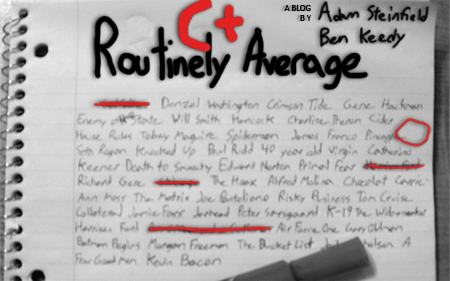The story is based in truth, and exceedingly simple. A French drug dealer is trying to sell a whole lot of illegal narcotics to a Brooklyn dealer. A pair of cops pick up the sent and the chase is on. On the surface level the film is fast-paced, exciting and has some terrific set-pieces. One chase scene in particular is ranked among the all-timers and makes the film worth-while all by itself. The character development is minimal thanks to the speed of the film. Only Gene Hackman's Popeye Doyle takes center stage.
Doyle and his partner, Detective Buddy Russo, played by Roy Scheider, are the two police officers who stumble across the drug deal thanks to Popeye's inability to take a night off. Popeye Doyle lives his job. His personal life is never shown because he has none. He defines himself as being a cop and because of that he needs to be a darn good one. For the most part he is a good cop. His hunches and relentless work rate get the police on the tale of what could become a huge drug bust that otherwise would have gone out without a hitch. It is so apparent that he is the driving force that even the criminals ID Doyle as their real problem without much prompting. We are also shown the flip side of that mentality though, as we see Doyle throw the law, and the safety of civilians and his fellow cops right out the window when it suits his needs.
Scheider is excellent as the partner Russo who is more of a typical "good" cop (Scheider was nominated for best supporting actor). Russo plays by the book, he thinks things through, he is loyal and capable. Yet, it is clear that Russo is along for the ride and would be nowhere without the bulldog that is Popeye Doyle.
The villain, charmingly played by Fernando Rey, is shown in many forms, including his home life where he is portrayed as a loving and kind husband. Of course he is also willing to kill if people get in his way. Yes there are cardboard cutout characters in The French Connection, but Friedkin did his best to blur the line. The collateral damage by Hackman is enough make anyone wonder by the end if it was worth it. And that brings me to the final scene of the movie. It is a frequently debated and controversial ending. I won't say much more about it, but you have to come up with your own thoughts, which I would be happy to discuss in an alternate forum.
The film took home 5 Oscars, including best picture, director, and the first best actor nod for Hackman who installs such an amoral ferocity in Doyle that he is both frightening and fascinating as the same time. Friedkin builds an amoral world around him, in which Doyle seems to move seamlessly. The French Connection tells of a reality where there are no absolutes and everything is grey. We have to decide for ourselves what kind of men we want policing that reality.
25/30

.jpg)

I haven't seen this movie since it originally came out in the theaters. Your review prompted me to rent it, and I enjoyed seeing it again. As I recall, at the time I felt the movie was unusual in its attempt to, as you mention, stay away from cardboard characters. For example, it wasn't the norm back then to show two detectives dance around when they finally get the information they have been waiting for on a wire tap. Without mentioning specifics, I have no problem with the "controversial" ending to the film. I think it fits the tone, and felt it was something that could have happened in the circumstances (in fact, I've often wondered how that sort of thing doesn't happen, if films portrayed those situations more realistically). Thanks for the review, which put this on my rental list.
ReplyDeleteI watched it with my family a few days ago which prompted the review. There is a lot outside the norm about this movie. I also like the ending. I think it perfectly compliments the rest of the movie's ambiguity.
ReplyDelete